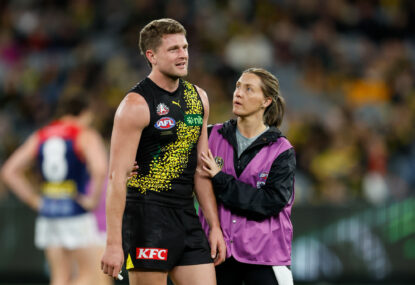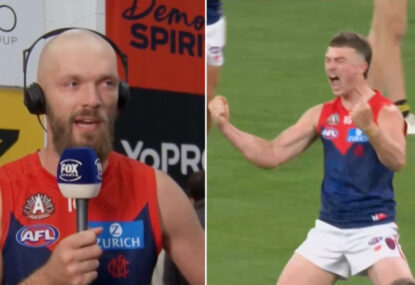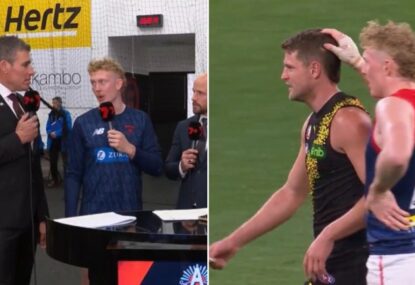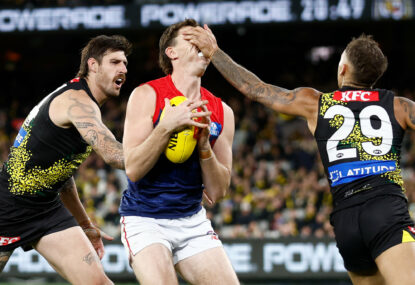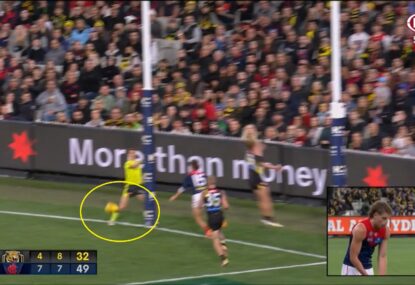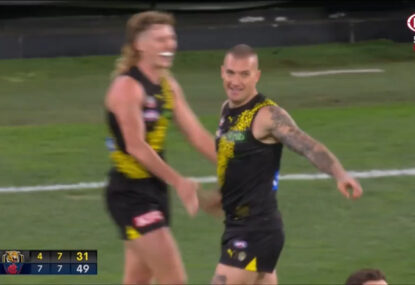It might have been yet another poor season for the Melbourne Football Club in season 2014, but unlike years past they weren’t as bad as you think they were.
After appointing (and sacking) two untried coaches since Neale Daniher’s mid-season departure in 2007, the Dees were always going to need to find someone from a successful background to help them rebuild yet again.
The eventual selection was Paul Roos. Roos’ primary intention was to turn the club into a competitive force and set them up for future success. For most of the season we have seen what the rewards of his hard work can reap.
However, the club also fell back to old habits and that dented the confidence of the playing group. The club lost nine straight matches to finish the season.
Let’s now take a look back at what went right and wrong for the Dees this year, and recap some of their most notable results in 2014.
Melbourne
Final ladder position: 17th (4-18, 68.4 percentage)
Rising Star nominees: None
Retirees/delistees: Mitch Clark and Shannon Byrnes
What went right?
The Dees’ decision to pluck Paul Roos out of his coaching retirement has been vindicated in many ways this year, with the club improving one very important key asset of their game plan – their defence.
He inherited Mark Neeld’s pre-2012 promise that the club would be “the hardest to play against” and indeed, some teams found it difficult scoring large against the Dees in 2014.
Even minor premiers the Sydney Swans could only manage nine goals when the teams met in Round 6.
Only six times this year did the club cough up the ton during the season – against the West Coast Eagles and North Melbourne twice each, as well as against the Geelong Cats and Hawthorn in rounds 17 and 20 respectively.
This is in stark contrast to last year when the club conceded triple figures on all but three occasions last year, with all three of those coming after Neeld was shown the door.
Additionally, the club won four games for the year, double their tally from last year when they won a paltry two games. Notably, however, all four of their wins were in “away” matches, including three at the MCG against Carlton, Richmond and Essendon.
Most importantly, however, they showed signs of competitiveness in some matches, including running Port Adelaide close twice during the year.
What went wrong?
The task that Paul Roos faced in trying to restore the spirit and competitiveness into a seemingly scarred playing group was there for all to see when the club suffered a 93-point loss to the West Coast Eagles in Round 2.
But while their defence as a whole did improve, conceding less than 2000 points in a regular season for the first time in a very long time, the club had the worst attack of any team in the competition, being the only team not to score triple-figures in a match in 2014, coming closest when they scored 14.9 (93) against the Kangaroos in their final match for the year.
Roos has also had to contend with an early season-ending foot injury to former vice-captain Jack Trengove, as well as the mental illness issues surrounding Mitch Clark, who subsequently announced his retirement from the game.
The club were also prevented from debuting Jesse Hogan during the regular season after the promising forward suffered a back injury during the pre-season. He has been seen by many as they key to Melbourne finally emerging from the ashes.
Best win: Round 7 versus Adelaide at the Adelaide Oval (won 11.4 (70) to 9.13 (67))
Among the club’s four wins, none came better than the one against the Adelaide Crows in Round 7 in which Melbourne recruit Bernie Vince starred against his old club.
The Dees started the match very well and led by as much as six goals in the second quarter, before surviving a late fightback by the Crows to win by three points, marking their first interstate victory since Round 21, 2012.
Paul Roos’ men also enjoyed victories over traditionally large-drawing clubs such as Carlton, Richmond and Essendon, the latter two of which will feature in the finals this year.
The one-point win over the Bombers in Round 13 came after the club suffered a 148-point humiliation in the corresponding match last year, one which ultimately proved fatal as far as Mark Neeld’s coaching career was concerned.
Worst loss: Round 21 versus GWS Giants at the MCG (lost 3.16 (34) to 15.8 (98))
Melbourne entered the Round 21 match against the injury-hit GWS Giants believing it could win, as the battle for the wooden spoon started to heat up.
However, after leading by three points at quarter-time, the Dees would crash to their worst performance for the year, losing by 64 points to a Giants side which could only operate on a one-man bench for the entire second half.
The performance would see the players booed off the MCG by their own fans, and coach Paul Roos refused to address his players post-match, only coming public about it for the first time on the following Monday’s AFL 360 show.
There were other notable losses during the year including the 93-point loss to the Eagles in Round 2, which showed just how far the Dees have to go if they are to one day return to their pre-2007 level of competitiveness.
The future
Coach Paul Roos has made clear his intentions of reshaping the Melbourne playing list ahead of the pre-season, declaring after the final-round loss to the Kangaroos that “every player is tradeable”.
A lot of players have been playing for their careers over the course of the season and their nine-match losing streak to finish the season means that Roos will be faced with many difficult decisions ahead of the AFL Draft in November.
The future of James Frawley was a major talking point in 2014 and will still continue to be. The Geelong Cats, Gold Coast Suns and Hawthorn have been heavily linked to him, and it will be interesting to see where he eventually ends up at.
The Dees have applied to the AFL Commission for a priority pick meaning that they could have picks number two, three and four in the draft, including the compensation pick they will receive if they lose Frawley as expected.
Roos has also signed on for the optional third season tying him to the club until the end of 2016, after which a successor will be appointed to take what is expected to be a much improved club forward.
While 2014 might not have been a successful year on the field as far as results were concerned, there is no doubt that the hard work put in by Roos and the players will soon translate into, hopefully, better results in 2015.





























































































